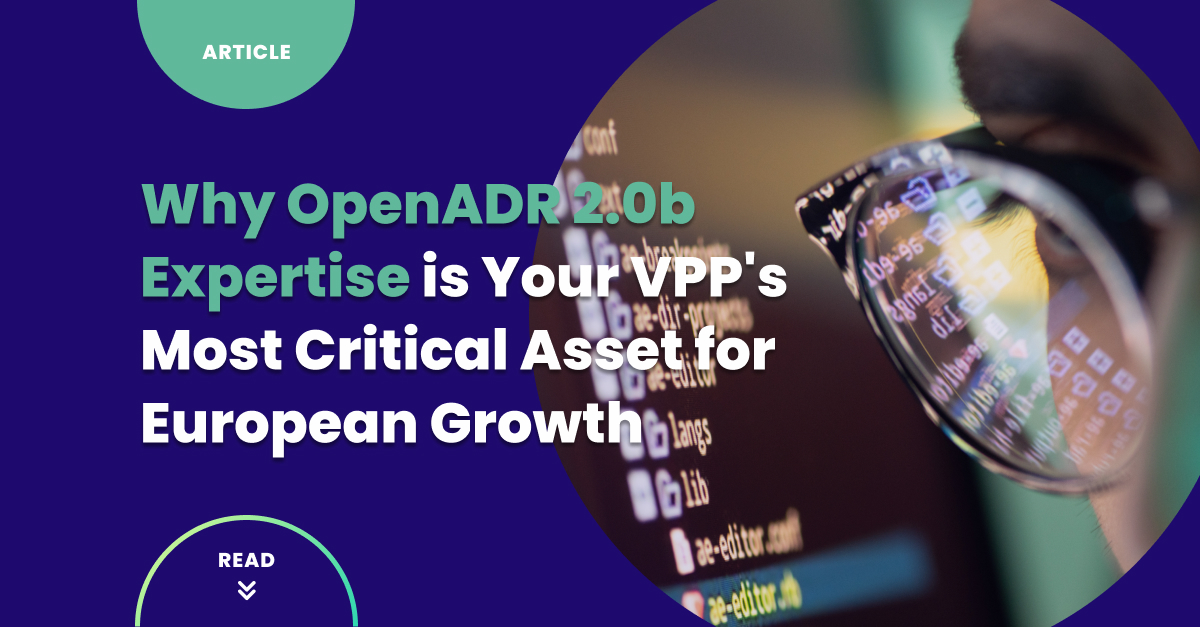The Cost of Non-Compliance: Why OpenADR 2.0b Expertise is Your VPP’s Most Critical Asset for European Growth

The high-stakes world of Virtual Power Plants promises immense growth, but that potential is directly tied to a platform’s ability to participate in various grid services and Demand Response markets. To unlock this, VPPs must comply with a complex and ever-evolving set of global interoperability standards. OpenADR 2.0b is one such standard, and while its name may sound technical, its importance is purely strategic.
For many VPP providers, however, a lack of in-house knowledge in implementing this standard is a significant barrier. This article will explore the high costs—both financial and strategic—of non-compliance and demonstrate why in-house expertise or a specialized partnership is essential for European growth.
What is OpenADR 2.0b and Why Is It Non-Negotiable?
OpenADR 2.0b is a global standard for automated demand response. It is a communication protocol that allows VPPs and other grid assets to communicate seamlessly with devices, aggregators, and grid operators in real-time. Compliance is not optional for companies looking to enter DR markets or work with aggregators in Europe. It is a prerequisite for device interconnection and access to a growing number of lucrative grid services.
The Hidden Costs of Non-Compliance
For a VPP provider, failing to properly implement OpenADR 2.0b can result in significant and often hidden costs:
Financial Costs:
- Market Lockout: Without OpenADR 2.0b compliance, a VPP platform is effectively locked out of specific DR and ancillary service markets that require the standard. This directly translates to missed revenue opportunities and a reduced total addressable market.
- Prolonged Development Cycles: Many VPP teams lack the in-house knowledge to implement these standards properly, leading to months of costly trial-and-error. This protracted development cycle delays market entry, pushing back the timeline for revenue generation.
- Certification Failures and Rework: The process of becoming OpenADR certified is rigorous. A failed attempt due to an improper implementation can lead to expensive rework, further extending delays and increasing costs.
Strategic Costs:
- Limited Device and Partner Ecosystem: A non-compliant platform struggles to integrate with a wide range of devices and third-party systems. This limits the platform’s flexibility and makes it less attractive to aggregators and partners who require interoperability.
- Perception of Risk: In a market where reliability and trust are paramount, a VPP that cannot demonstrate compliance with a global standard like OpenADR is perceived as a greater risk. This can impact a company’s ability to secure key partnerships and customer contracts.
The Solution: Navigating the In-House vs. External Expertise Challenge
The most efficient way to achieve compliance is not through costly and time-consuming internal trial-and-error. While building in-house expertise may seem appealing for long-term control, it comes with significant challenges:
- Time and Resource Investment: Hiring and training a team to become proficient in complex standards like OpenADR takes significant time, delaying critical projects.
- Lack of Practical Experience: Without a history of successful implementations, an internal team may still face a steep learning curve and the risk of certification failure.
A more strategic approach is to partner with engineering experts who are fluent in implementing and testing for OpenADR, IEEE, and other DR protocols. This partnership offers several advantages:
- Accelerated Compliance: An external partner can leverage pre-existing knowledge and certified modules to drastically reduce the time to compliance, saving clients months of trial-and-error.
- Cost-Effectiveness: This approach allows companies to avoid the high costs of failed internal efforts and development delays.
- Focus on Core Business: By outsourcing a specialized task like protocol implementation, a VPP provider can focus its internal teams on its core product and innovation, not on the complexities of a technical standard.
Navigating the OpenADR Challenge: A Strategic Perspective
OpenADR 2.0b compliance is not just a technical checkbox; it’s a strategic imperative for any VPP provider with ambitions for European expansion. The costs of non-compliance—from being locked out of lucrative markets to suffering significant development delays—are simply too high to ignore. Whether you choose to invest in building an expert in-house team or partner with a specialized firm, the key is to make a deliberate choice to prioritize compliance. The right expertise can accelerate your platform’s growth and secure your place in the future of the energy market.
